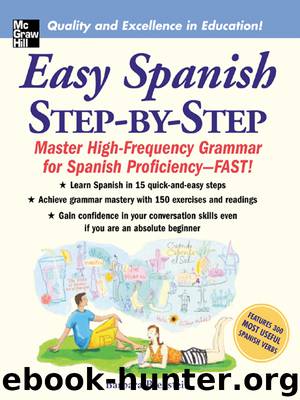Easy Spanish Step-by-Step

Author:Barbara Bregstein
Language: eng
Format: epub
Tags: Easy Spanish Step-By-Step
Publisher: McGraw-Hill Education
Published: 2012-01-17T16:00:00+00:00
Verbs like gustar
You have just learned a very important form, not only to express the idea of I like, but for other verbs as well. The following verbs are used with an indirect object.
agradar to be pleasing to (very close in meaning to gustar)
¿No te agrada nadar? Isn’t swimming pleasing to you?
Me agrada vivir en el campo. To live in the country is pleasing to me.
convenir to suit someone, to be convenient (for)
¿Te conviene tomar ese trabajo? Does it suit you to take that job?
No nos conviene viajar ahora. It does not suit us to travel now.
doler to be painful, to hurt
Me duele la cabeza. My head hurts me.
Te duelen los dientes. Your teeth hurt you.
¿A Uds. les duelen los pies si caminan mucho? Do your feet hurt you if you walk a lot?
NOTE: In Spanish, the possessive adjective is not used with parts of the body and the indirect object pronoun.
encantar to be enchanting to, to like very much
Le encanta viajar. To travel is enchanting to him. (He loves traveling).
Le encanta visitar España. To visit Spain is enchanting to him.
NOTE: Encantar is much stronger than gustar. Encantar cannot be used in the negative.
faltar to be lacking (something), to be missing (something)
A ellos les falta disciplina. They lack discipline.
Aquí falta luz. Here there is no light.
NOTE: Faltar can be used without the indirect object pronoun.
fascinar to fascinate, to be fascinating (to)
Nos fascina el baile flamenco. Flamenco dance fascinates us.
Me fascinan estos dibujos. These drawings are fascinating to me.
hacer falta to need (something)
Me hace falta tomar unas vacaciones. I need to take a vacation.
importar to be important to, to matter
No me importa. It is not important to me.
A Sandra le importan sus amigos. Sandra’s friends are important to her.
No importa. It doesn’t matter. /Never mind.
NOTE: Importar can be used without the indirect object pronoun.
interesar to be interesting (to)
Les interesa estudiar. To study is interesting to them.
Me interesa ir a museos. It interests me to go to museums.
molestar to bother, to annoy
¿Le molesta si alguien fuma? Does it bother you if someone smokes?
A él no le molesta nada. Nothing bothers him.
parecer to seem, to appear to be
Me parece que es una buena escuela. It seems to me that it is a good school.
Parece que va a llover. It seems that it is going to rain.
NOTE: Parecer can be used without the indirect object pronoun.
quedar to be left over, to remain
Nos quedan veinte minutos. We have 20 minutes left.
No me queda mucho dinero. I don’t have much money left.
¿Cuántas páginas nos quedan por leer? How many pages are left for us to read?
NOTE: Quedar por + an infinitive = to remain to be.
sobrar to have more than enough of (something)
Me sobra comida para mañana. I have more than enough food for tomorrow.
tocarle a alguien to be someone’s turn
Cada vez que me toca a mí, gano. Every time it’s my turn, I win.
Cada vez que le toca a él, pierde. Every time it’s his turn, he loses.
Download
This site does not store any files on its server. We only index and link to content provided by other sites. Please contact the content providers to delete copyright contents if any and email us, we'll remove relevant links or contents immediately.
Housekeeping by Marilynne Robinson(3428)
The Poetry of Pablo Neruda by Pablo Neruda(3380)
Papillon (English) by Henri Charrière(3285)
World without end by Ken Follett(3017)
TCP IP by Todd Lammle(2650)
Fluent Forever: How to Learn Any Language Fast and Never Forget It by Gabriel Wyner(2461)
The Rape Of Nanking by Iris Chang(2332)
The Alchemist by Paulo Coelho(2311)
How Proust Can Change Your Life by Alain De Botton(2270)
The Partner by John Grisham(1991)
Two lives by Helen Naylor(1951)
Hitler by Ian Kershaw(1760)
Yerma by Federico García Lorca(1647)
Smilla's Sense of Snow by Peter Hoeg(1621)
Merriam-Webster's Pocket Dictionary by Merriam-Webster(1572)
Il cavaliere inesistente by Italo Calvino(1558)
Sophie's World by Jostein Gaarder(1557)
Deep Writing by Eric Maisel(1530)
Twilight of Idols and Anti-Christ by Friedrich Nietzsche(1501)
